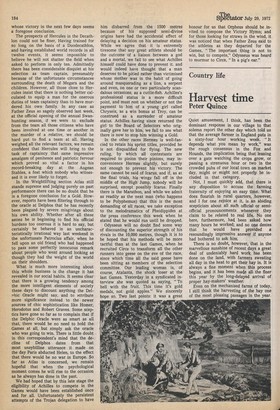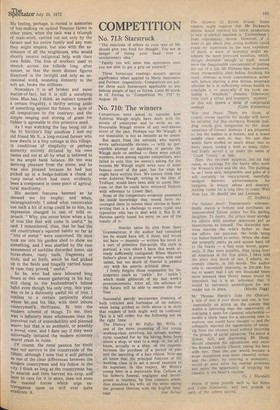Country life
Harvest time
Peter Quince
Quiet amusement, I think, has been the dominant response in our village to that solemn report the other day which told us that the average farmer in England puts in a sixty-four hour working week. "It depends what you mean by work," was the rough consensus in the Fox and Hounds, the implication being that leaning over a gate watching the crops grow, or passing a strenuous hour or two in the crowded pubs of our local town on market day, might or might not properly be in eluded in that category.
Not, I must quickly add, that there is any disposition to accuse the farming fraternity of enjoying an easy time. What does flourish in rural quarters, however, and I for one rejoice at it, is an abiding scepticism about all such official or semiofficial pronouncements whenever they claim to be related to real life. No one here, furthermore, had been asked how many hours he worked; and no one denies that he would have provided a resoundingly impressive answer if anyone had bothered to ask him.
There is no doubt, however, that in the marvellous sunshine of recent days a great deal of undeniably hard work has been done on the land, with farmers sweating all day in the heat to get their hay in. It is always a fine moment when this process begins, and it has been made all the finer this year by the long-delayed arrival of proper hay-makers' weather.
Even on the mechanised farms of today, I still think the harvesting of the hay one of the most pleasing passages in the year. My feeling, perhaps, is rooted in memories of hay-making on upland Pennine farms in other years, when the task was a triumph of team-work, carried out not only by the farmer and his entire family and any man they might employ, but also with the assistance of all the neighbours, who would shortly receive reciprocal help with their own fields. The line of workers used to stretch across the hillside long after sunset, so that the more distant figures dissolved in the twilight and only an occasional word, sounding distantly in the soft air, broke the stillness.
Nowadays it is all brisker and more matter-of-fact, but it is still a satisfying time. Man has, I think, an instinct towards a certain frugality, a thrifty setting aside of something against the future, in spite of all temptations to the contrary; and the simple reaping and storing of grass for fodder is agreeable to this primitive need.
As I was watching the hay being cut in the St Swithin's Day sunshine I met my old friend Mr S., a long-retired farmer who now dwells in a tiny cottage in this village, in conditions of simplicity or perhaps austerity entirely dictated by his own tastes and not at all by what is believed to be his ample bank balance. He too was deriving pleasure from the scene, and he was also pleased because he had just picked up in a hedge-bottom a chunk of rusty metal which had once, evidently, been a component in some piece of agricultural machinery.
His ancient features beamed as he showed me his trophy; and when, unimaginatively, I asked what conceivable use such a bit of scrap could be to him, his expression changed to one of mild reproach. "Why, you never know when a bit of iron like that will come in useful," he said. I remembered, then, that he had the old countryman's squirrel habits so far as "bits of metal" were concerned. He once took me into his garden shed to show me something, and I was startled by the vast assortment of suchlike discarded items, old horse-shoes, rusty nails, fragments of tools, and so forth, which he had picked Up in the fields and frugally carried home in case they proved "useful."
So he, who had once laboured long hours at this season gathering in his hay, Still clung to the husbandman's inbred habit even though his only crop, this year, was to be a dubiously useful bit of iron. I confess to a certain perplexity about Where he and his like, with their inborn countryman's thriftiness, fit into the modern scheme of things. To me, their way is infinitely more wholesome than the prevalAnt cult of expendability and planned NAraStA: but that is an aesthetic, or possibly a moral, view, and I dare say if they were univArsally imitated the modern economy Would crash in ruins.
of course, the rural passion for thrift may not survive in the countryside of the future, although I note that it still persists as one of the clear differences between the modern countryman and his fellow in the City. I think as long as the countryman has to nourish and then harvest his crop, and later to care for it in store, then not even the massed forces which urge extravagance upon us will ever quite eradicate it.









































 Previous page
Previous page